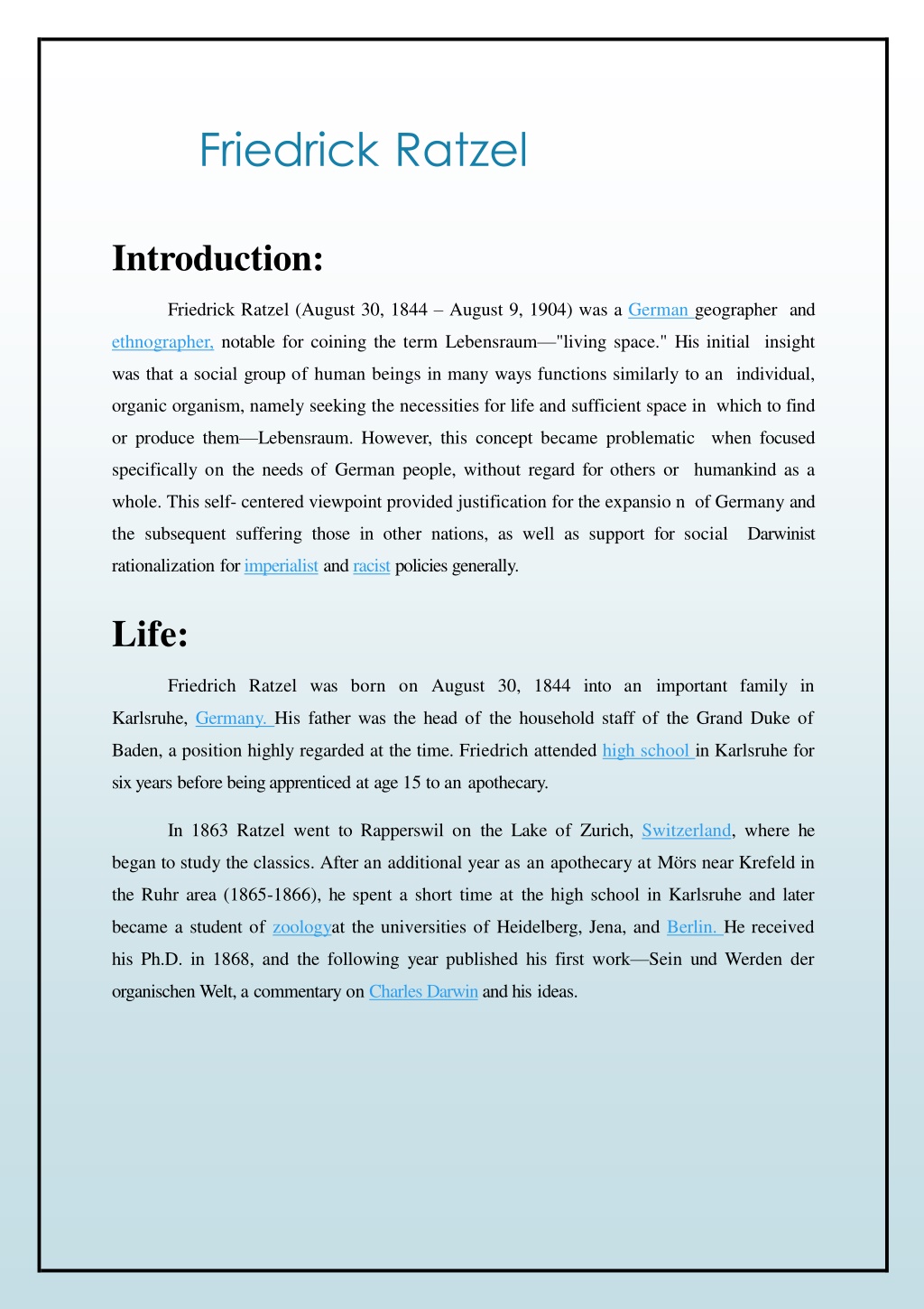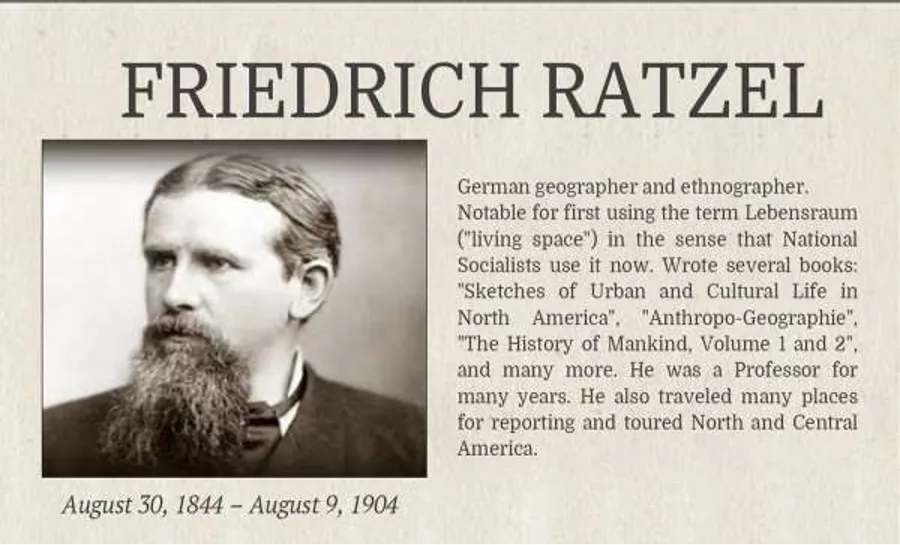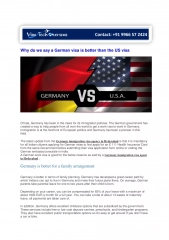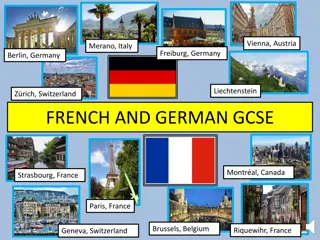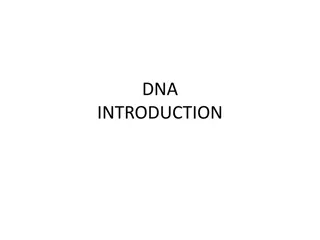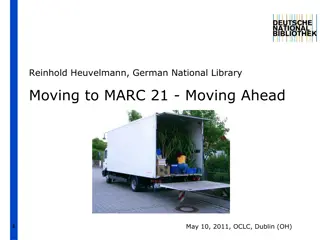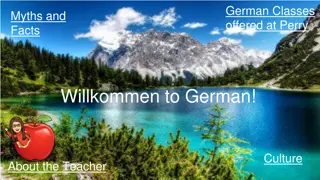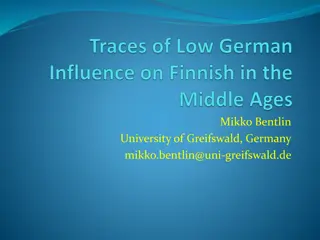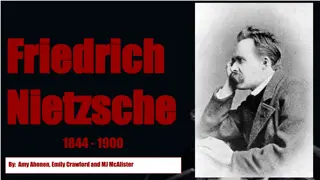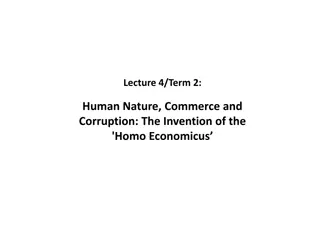Friedrich Ratzel: German Geographer and Ethnographer
Friedrich Ratzel, a prominent German geographer and ethnographer, introduced the concept of Lebensraum, emphasizing the importance of living space for social groups akin to organic organisms. His work was marked by a self-centered viewpoint that rationalized imperialist and racist policies. Ratzel's journey from zoologist to geographer involved extensive fieldwork, including trips to North America, which led to significant contributions in cultural geography. Despite his impactful career, Ratzel's legacy remains controversial due to his association with concepts like Lebensraum and social Darwinism.
Download Presentation

Please find below an Image/Link to download the presentation.
The content on the website is provided AS IS for your information and personal use only. It may not be sold, licensed, or shared on other websites without obtaining consent from the author. Download presentation by click this link. If you encounter any issues during the download, it is possible that the publisher has removed the file from their server.
E N D
Presentation Transcript
Friedrick Ratzel Introduction: Friedrick Ratzel (August 30, 1844 August 9, 1904) was a German geographer and ethnographer, notable for coining the term Lebensraum "living space." His initial insight was that a social group of human beings in many ways functions similarly to an individual, organic organism, namely seeking the necessities for life and sufficient space in which to find or produce them Lebensraum. However, this concept became problematic when focused specifically on the needs of German people, without regard for others or humankind as a whole. This self- centered viewpoint provided justification for the expansio n of Germany and the subsequent suffering those in other nations, as well as support for social Darwinist rationalization forimperialist and racist policies generally. Life: Friedrich Ratzel was born on August 30, 1844 into an important family in Karlsruhe, Germany. His father was the head of the household staff of the Grand Duke of Baden, a position highly regarded at the time. Friedrich attended high school in Karlsruhe for sixyears before beingapprenticed at age 15 to an apothecary. In 1863 Ratzel went to Rapperswil on the Lake of Zurich, Switzerland, where he began to study the classics. After an additional year as an apothecary at M rs near Krefeld in the Ruhr area (1865-1866), he spent a short time at the high school in Karlsruhe and later became a student of zoologyat the universities of Heidelberg, Jena, and Berlin. He received his Ph.D. in 1868, and the following year published his first work Sein und Werden der organischen Welt, a commentary on Charles Darwin and his ideas.
After the completion of his schooling, Ratzel started to travel, an experience that transformed him from a zoologist/biologist to geographer. He began fieldwork in the Mediterranean, writing letters about his experiences. These letters led to a job as a traveling reporter for the K lnishe Zeitung newspaper, which provided him the means for further travel. His career was interrupted by the Franco-Prussian War of 1870-1871. Ratzel joined the army, and traveled through Hungary and over the Carpathians, where he saw villages with German people living in a foreign land. This experience stimulated his interest in human geography and influenced his later work. After the war, Ratzel embarked on several expeditions, the lengthiest and most important being his 1874-1875 trip to North America, Cuba, and Mexico. He studied the influence of people of German origin in the United States, especially intheMidwest, as wellas other ethnicgroups inNorthAmerica. He produced a written work of his account in 1876, Stadte- nd Culturbilder aus Nordamerika, which would help establish the field of cultural geography. According to Ratzel, cities are the best places to study people because life is "blended, compressed, and accelerated" in cities, and they bring out the "greatest, best, most typical aspects of people." Ratzel had traveled to cities such as New York, Boston, Philadelphia, Washington, D.C., New Orleans, and San Francisco to conduct hisresearch.
Upon his return in 1875, Ratzel became a lecturer in geography at the Technical High School in Munich. In 1876 he was promoted to assistant professor, which rose to a full professorship in 1880. While at Munich, Ratzel produced several books and established his career as an academic. In 1886, he accepted an appointment at the University of Leipzig. His lectures were widely attended, notably by the influential American geographer Ellen Churchill Semple. Ratzel produced the foundations of human geography in his three- volume Anthropogeographie from 1882 to 1891. This work was misinterpreted by many of his students, creating a number of environmental determinists. He published his work on political geography, Politische Geography, in 1897. It was in this work that Ratzel introduced concepts that contributedto Lebensraum and later to social Darwinism. Ratzel continued his work at Leipzig until his sudden death on August 9, 1904, while on holidaywithhiswifeand daughtersinAmmerland, Germany. Ratzel Contribution andAchievements: Influenced by thinkers like Charles Darwin and zoologist Ernst Heinrich Haeckel, Ratzel wrote on a variety of topics, ranging from zoology and biology to geography, cultural geography, and geostrategy. His famous essay Lebensraum (1901), for example, dealt with the topic of biogeography. Through his writings, Ratzel created a foundation for the uniquely German variantof geopolitics geopolitik. Ratzel s key contribution to geopolitik was the application of the biological concept of growth and development to geography. Until then, states with their borders were considered static, bound to a certain geographic location. States, however, according to Ratzel, are organic and growing, with borders representing only a temporary halt in their movement. Just like a biological organism grows and develops, it is not natural for states to be static. The expanse of a state s borders isa reflection of thehealth of the nation. Ratzel s idea of Raum (space) grew from his organic state conception. His early concept of Lebensraum did not consider political or economic expansion, but rather spiritual and racial nationalist expansion. He regarded the Raum- motiv as a historical driving force, pushing peoples with great Kultur to naturally expand. Space, for Ratzel, was a vague
concept, theoretically unbounded just as was Hitlers later. Raum was defined by where German people live, where other weaker states could serve to support German people economically, and where German culture could fertilize other cultures. However, it ought to be noted that Ratzel did not use his concept of Raum in an aggressive manner, but he simply theorizedabout thenatural expansion of strong states intoareas controlled by weaker states. Ratzel s writings coincided with the development of the Second Industrial Revolution, after the Franco-Prussian War, and the subsequent search for markets, that brought Germany into competition with England. Influenced by the American geostrategist, Alfred Thayer Mahan, Ratzel wrote of aspirations for German naval reach, arguing that sea power, unlike land power, was self-sustaining, as the profit from international trade would pay for the merchant marines. Ratzel's writings were widely welcomed, especially as a justification forGerman imperialexpansion. Legacy: Ratzel's writings, especially his concept of Lebensraum, were used in the development of Social Darwinism. Ratzel influenced numerous scholars in the area of geopolitics. German geostrategist, Karl Haushofer, integrated Ratzel s ideas on the division between sea and land powers into hisown theories, adopting the view that borders arelargely
insignificant, especially as the nation ought to be in a frequent state of struggle with those around it. Rudolf Kjell n was a famous Swedish student of Ratzel's, who further elaborated on his "organic state theory" and who coined the term geopolitics. Kjellen s interpretation of Ratzel was very popular among Nazis, and was used as a justification for German expansionistic politicsleadingto World WarII. Quotations: "A philosophy of the history of the human race, worthy of its name, must begin with the heavens and descend to the earth, must be charged with the conviction that all existence is one a single conception sustained from beginning to end upon one identical law." "Culture grows in places that can adequately support dense labor populations." Ratzel Main Geographic Works: Anthropogeographie: In Anthropogeographie (vol. 1, 1882, and vol. 2, 1891) he considered population distribution, its relation to migration and environment, and also the effects of environment on individuals and societies. His other works included Die Erde und das Leben: Eine vergleichende Erdkunde(1901 02|); Earthand Life:A. Although Ratzel s ideas certainly had an effect in the period after world war I, subjectively he still belonged to Europe s pre-1914 era. This is apparent, for example, from his insistence that spatial growth of the state need not necessarily resemble that of other aggregate-organisms and take the form of an amorphous extrusion beyond existing boundaries into immediately adjacent areas. Rather, he believed that the expansion of advanced states could be a rational and planned affair, accomplished through the selective sending out of groups of excess population for the purposes of colonization (1899-1912: I, 147-48, 167-68). The territorial needs of these groups could be met through land acquisition overseas, in the non-European world (1899-1912: I, 167-68). As noted, Ratzel rejected the idea of territorial expansion on the European continent itself. Moreover, although he did
adopt the view of relations between states as a struggle for space, which meant existence, it may well be argued that he did not necessarily feel that the ultimate outcome of this would be a general armed conflagration. Despite a not infrequently aggressive tone, in important respects his thinking unmistakably reflected some of the dominant optimism of nineteenth- century liberalism. This was an ambiguity that Ratzel shared fully with social darwinism in general, and in his writings as well can be found the vision of the progressive march of civilization toward ultimate perfection. One example of this was his optimistic conviction that the petty squabbles between the nations of Europe would be irresistibly overcome by the further development of international commerce and transportation (1898: 144-45; 1899-1912: I, 242; 1901-1902: II, 676). In this spirit, he may well have ultimately allowed for the possibility of a peaceful and mutually satisfactory solution of the existing space- need through international negotiation and moderation. The outbreak of world war I dashed forever the hope that developments might in fact follow such a course, and Germany s situation after 1918 led rather to an intensification of theideas we havebeendiscussing. The overseas colonies were lost with no prospect of reacquisition, but even more damaging was the loss of territories in Europe itself that the Germans considered to be rightfully theirs. The atmosphere of the 1920s was consequently marked by a sense of mass claustrophobia and obsession with Germany s space-need, an obsession well demonstrated by the remarkable popularity of works such as Hans Grimm s Volk ohne Raum (A people without space) (Grimm, 1927; Smith, 1983), or by the flourishing of the new science of Geopolitik. In such an atmosphere, Ratzel s postulates about Lebensraum seemed to take on a new relevance and urgency (Lange, 1965: 432-33), and his Political geography appeared in its third and definitive edition in 1923. The value of his arguments remained the fact that they seemed to offera scientific basis and justification fortheseconcerns.
FIG: ANTROPO GEOGRAPHIE BY RATZEL Polistiche Geographie: For Ratzel, the cultural development of a state was inseparable from its spatial growth. Consequently, states of limited territorial extent, such as tribal groupings in Africa, were associated with lower levels of development. This condition Ratzel termed K leinraum (1899- 1912:1, 236-38, 241; 1923: 152-53). The advance of civilization was marked everywhere by theprogressive broadening of theterritorial base of thestate. In considering the present and the future, Ratzel declared repeatedly that the territorial base of the European states had become too narrow, and would in the future have to give way to the modern principle of Grossraum. Concerning precisely what was meant by the designation gross, or large, Ratzel remained vague, but judging from his usage it implied a state with physical dimensions greater than those normal or indeed possible on the European continent. Ratzel did not coin this term, which had already been used in the German literature
on political economy some three decades earlier (von Inama-Sternegg, 1869: 9ff; Faber, 1982: 392), but within his system it acquired a new significance. His models came from the non-European world, most notably from the impressive example of the rapid and vibrant colonization of the United States, but included Australia, Russia, and China as well (1905: 476; 1923: 264, 270). These countries, he insisted, exemplified the pattern that was to be the wave of the future: politically unified states based on continental or at least sub continental land masses (Faber, 1982: 392). Ratzel expressed an understandable consternation at the fact that it was indeed the young non- European powers which seemed to have the spatial advantage, but most fundamentally his urging of the Grossraum principle was intended, as was his entire theory, to awaken Germany to the enormity of the stakes in the current struggle forcolonial acquisitions. It is entirely logical that in Ratzel s theory of the state and political expansion the idea of the people as a nation or Volk was accorded only a minor significance. The state for him was an organic whole that developed out of the interaction between a group of people and the territory they occupy - ein Stuck Boden und ein St ck Menschheit, in his famous formulation (1923: 2). It is precisely this shared relationship to the land that waa wnportant in bonding the group together, and not an a priori ethnic or racial kinship. He made this point explicitly in defining the Volk as a politically united body made up of groups and individuals, who need neither to be related ethnically nor linguistically, but who through their common territory are spatially linked together (verbundene) (1923: 3, emphasis added). Ratzel did not deny the existence of ethnicity as such, and even allowed that the circumstance of ethnic kinship had historically been one factor, among many, for fostering cohesion and unity within a state (1923: 141). He left no doubt, however, that in the Europe of his day it was unacceptable to continueto viewethnicor national affinityas theultimate basis for theformation of the state. To the national principle outlined earlier in this essay, Ratzel emphatically contrasted his own geographical or territorial principle, and insisted that in the modern world the basis for a successful state must be the idea of Grossraum. Accordingly, he condemned the striving for an exclusively nationally founded state, or Nationalitdtenpolitik, which represented a dreamy goal for many of his contemporaries in central and Eastern Europe: Ratzel applied this logic with admirable consistency to the situation in his own country. In an early essay, for example, he rejected on principle the claims of the Germans in the Baltic regions to membership in a German state, arguing that this would violate the exclusively geographical or territorial logic which must be the foundation of all political unions (1878: 198). He firmly
adhered to this position in his later work. In so doing, he not only opposed a popular current of the time, but indeed raised fundamental questions at the outset about an issue that was to become nothing less than a holy cause for many of his countrymen. Within the context of the tensions between nation and empire discussed earlier in this essay, the significance of Ratzel s political geography is unmistakable. He has discarded as retrograde the classic nineteenth-century idea of the nation state as the ultimate form of political organization, and offered in its stead something radically different. Presented in the language of the age, using, that is, the scientific precepts of a rudely materialist social darwinism, his system was a coherent formulation and justification of the concern that animated Europe s modern age of imperialism: the drive for political expansion. Its inordinate significance lay in the fact that it replaced an essentially restricted ideal of political organization - limited spatially to the distribution of the nationality and its national territory, and bound at least in theory by notions of international coexistence - with a vision of biologically founded expansion having no ultimate goal besides that of further growth andexpansion. In an early discussion of Ratzel, Franz Neumann identified this fundamental aspect of his thinking and expressed it succinctly with the observation that The laws of movement ... and space cannot be reconciled with the notion of a unified legal and political sovereignty over a specific area (1944: 139). O lder standards of relations between states were overruled by the single exigency of the struggle for space, and success in the endeavour to expand became thesolecriterionformoral judgement. FIG: POLITISCHE GEOGRAPHIE BY RATZEL
Unity in diversity: Unity in diversity is a concept of "unity without uniformity and diversity without fragmentation"[1] that shifts focus from unity based on a mere tolerance of physical, cultural, linguistic, social, religious, political, ideological and/or psychological differences towards a more complex unity based on an understanding that difference enriches human interactions. It has applications in many fields, includingecology, cosmology,philosophy religionand politics. The idea and related phrase is very old and dates back to ancient times in both Western and Eastern Old World cultures. The concept of unity in diversity was used by both the indigenous peoples of North America and Taoist societies in 400 500 B.C. In premodern Western culture, it has existed in an implicit form in certain organic conceptions of the universethat developed inthecivilizations of ancient Greeceand Rome. "Unity in diversity" is used as a popular slogan or motto by a variety of religious and political groups as an expression of harmony and unity between dissimilar individuals or groups. The phrase is a deliberate oxymoron, the rhetorical combination of two antonyms, unitas "unity, oneness" and varietas "variety, variousness". When used in a political context, it isoften used to advocate federalism and multiculturalism. Personal view of ratzel: Geography is the best subject to be part of, because it allows me - if I wish - to explore anything or everything that happens on or near the surface of the Earth. That should be enough to keep anyone happy, however broad their interests. In this Dep artment alone, students and staff can engage in a very broad spectrum of subjects, from glaciology to the oceanography, from the biosphere to the constantly changing atmosphere, from air pollution to human health, and from social inequalities to the views of one Earth offered by the latest satellite and GIS technologies. When we also consider our close partners in Geoscience, that scope widens yet further, to include mountain building, volcanoes, the slow motion of continents, the landscapes of the ancient earth. In St Andrews, as in many other Universities, the boundaries between geography and geoscience/geology are not clear and sharp. They grade seamlessly into one another, just as geography grades into many other disciplines, such as meteorology, sociology, archaeology, history, epidemiology, rock mechanics, physics, and
so on. Geography shares with these adjacent subjects many of their methodologies, techniques, and philosophies , adding yet further to the diversity of geography as it is practiced today. Geography is certainly diverse. Diverse in its subject matter and its methods, diverse in its aims, diverse it its language. So much so that one has to be expert in several sub- dialects of English to hope to converse with all of the staff members in this building. The diversity of geography isnot inquestion.Butisit unified? Many answers have been suggested, and many definitions of geography have been offered. Perhaps no definition will ever satisfy all geographers, nor encompass all of the things that geographers do. But I don't believe that really matters because, in a sense, all definitions are really just flags of convenience, just figments of our imagination that allow us to think we understand a thing. Geography is too big, too diverse, its borders too porous for it to fitneatly intoone singledefinition,one singlecompartmentof human endeavour. But I believe it is unified. Geography is unified because the world is unified. The world is all one world, as images taken from outside our Earth so c learly show. The Earth is unified in the sense that it is one shared space, a common canvas on which all things are drawn. But deeper than that, the Earth is unified because all things upon (and beyond) it are interconnected, forming a single interconnected whole. No single thing stands isolated and apart from any other: people are connected to the land through our needs for food, water, shelter, and air. People are connected to each other in ceaseless networks of competition, co- operation, and need. The atmosphere and the solid earth, the circulating waters, and the cycles of food chains, the nexus of cause and effect bind everything together in one whole. The diversity of the world invites a diversity of methods for its study. There is no single methodology that can guarantee success in all situations: methods need to be tailored to circumstance. In this sense, the diversity of methodologies within geography should be regarded as a strength, not a source of discord. The world is not compartmentalized; all subjects grade one into the other. The world, the common ground of geographers, provides us with our point of reference, our unity. As geographers we learn to read the world, to try to know its connections, and the relationships between diverse things, to try to understand how the triumphs and tragedies of today have unfolded from the worlds of the past, and how the decisions and events of today will shape theworldoftomorrow.
Conclusio n: This essay attempted an analysis of Ratzel s political geography within the context of the imperialism of the late nineteenth century. The practice of political expansion and the incorporation of foreign societies was fundamentally at odds with the nation-state ideal that had dominated for most of the century, and out of this tension arose new theories and intellectual systems better suited to the exigencies of the new status quo. Ratzel s political geography figured importantly among such theories. Based on analogies between the organic world and human society, it presented a thoroughly principled rejection of the nation-state idea, and postulated instead the need for ongoing physical expansion to insure the vitality of the state. Although his was not the only attempt to formulate such a theory, Ratzel s specific contribution lay in the creation of an appealing system and terminology that supplied a seemingly scientific explanation and justification for expansionism (Schulte-Althoff, 1971: 144). In a materialist age that venerated science, this was of considerable significance. To the extent that national socialist ideology maintained continuity with the nineteenth-century imperialist tradition in general, it could adopt essentially as its own the core of Ratzel s theory of biological expansionism and Lebensraum. Department of Geography, University of Wisconsin, USA. References: http://www.newworldencyclopedia.org/entry/Friedrich_Ratzel o https://books.google.com.pk/books/about/ Anthropogeographie.html?id=e GyLpwAACAAJ&re o dir_esc=y https://www.amazon.com/Politische-Geographie-German-Friedrich-Ratzel/dp/114364705X o o https://www.google.com/search?client=opera&hs=pKa&q=friedrich+ratzel+co ntribution+to+geography&sa=X&ved=0ahUKEwi707CMrOLdAhUHzYUKHf H8DgIQ1QIIxAEoAw&biw=1240&bih=659 o https://www.google.com/search?q=UNITY+AND+DIVERSITY+BY+RATZEL &client=opera&tbm=isch&tbs=rimg:CVrcWjYnFuOEIjhSDb-1T9PT-3Nf- qZl-yHMLhD-JVe73nct81GzICUyB1OiM-
